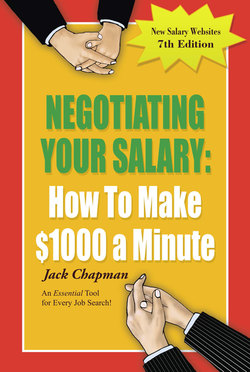Читать книгу Negotiating Your Salary - Jack Chapman - Страница 20
На сайте Литреса книга снята с продажи.
The Preemptive Strike
ОглавлениеMy acknowledgments to Marty Nemko, author of Cool Careers for Dummies, for the following technique which I’ve dubbed the Preemptive Strike. Marty suggests that instead of postponing salary talk, you, the candidate, should bring it up early and get it out of the way. I’m impressed: I think this can work!
We differ as to why you’d do it, but we agree it takes the pressure off. Marty suggests it, I believe, as a way around Salary-Making Rule 1. In his opinion, it’s better to “do it up front and get it out of the way” than to postpone it. My perspective on Marty’s method is that it’s a marvelous way to actually follow Salary-Making Rule 1. If you find it awkward to play “dodge the salary” when the employer brings it up you can head off that entire scene using his “handle it now” technique.
[BTW I like his book; he “breaks the rules” of conventional career counseling and the thinking is refreshing. His book, actually, recommends you wait for “the moment when the boss seems maximally enthusiastic about ... you working for him,” which in my interpretation means wait until there’s an offer. It’s in conversation with him that he proposed this alternative to postponing salary talk.]
Here’s how the preemptive strike works. After you have developed some rapport with the interviewer and have had some discussion about your skills, the job, etc., you casually pop this question, “By the way, Mr. Employer, I know it’s too early to discuss compensation in detail, but I wonder if you can give me a rough idea of the range you were thinking of with regard to this position?”
It doesn’t matter much what they answer! Later, when you get to the judgit stage you’ll still be able to negotiate your best price. What does matter is that by getting them to spill the beans, you avoid them asking you what your salary expectations are. On the other hand, this option runs a small risk of appearing more interested in money than the job and the risk, too, of them turning the tables and asking about your expectations.
And once they’ve answered? The following response will steer you back on the main road, “Thank you. I’m confident if I’m the right person for the job we can find a salary that works.” Then focus attention back on the job interview with, “Tell me more about the key problems you want handled on this job,” or, “Let’s discuss the management style your company wants to see.” Any question that puts the interviewer back on exploring the match between you and the job/company will do.
Notice how this question and reply not only helps the employer relax about being able to afford you, but also postpones real salary discussion until later. Properly done, your reply doesn’t accept the range as-is, you’re still free to negotiate more.
